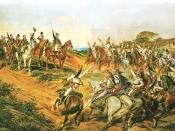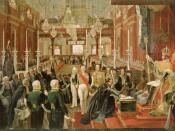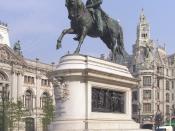When we think of a country gaining freedom, we usually picture
bloody coups, assassinations, civil wars, and demonstrations. We think of
thousands of guerrillas or freedom fighters protesting the old regime and
bidding to overthrow the present government. The above was true for almost
all the countries, but this essay will concentrate on the one where one man's
poetic cry "Independence or death!" meant freedom for the whole nation. It is
truly my belief that Brazil owes its independent status to Dom Pedro and his
hurt pride. I will explain this thought further on, but I'll start by talking about
how Brazil overgrew its mother country Portugal which led to the events of
1822...
During colonial days the greater part of the immense area of Brazil
was covered with dense forests. Brazil is dowered with a rich and fertile soil,
and, as Joao Pandia Calogeras mentioned, it was capable of yielding
bountiful crops such as corn, manioc, sweet potatoes, and plantains.
He goes
on to say that the seas, lakes, and rivers teem with fish of every kind. Brazil
was a veritable giant in comparison with a mother country such as Portugal,
small in area and limited in resources. Prior to the discovery of gold, Brazil
was an agricultural colony. Because of such great resources, the colonies
soon became autonomous, self-sustaining units. "Only a few articles were
contributed from Portugal chiefly wine and olive oil" ( Calogeras 23). Cotton
was cultivated, cattle and poultry grew and multiplied. In a short time there
was a surplus of products, and the colonists started to export them to the
mother country.
According to Ronald M. Schneider, by the end of 17th century cattle
raising, sugar and tobacco manufacturing have taken on huge proportions. In
fact, Capistrano de Abreu went so far as to...


